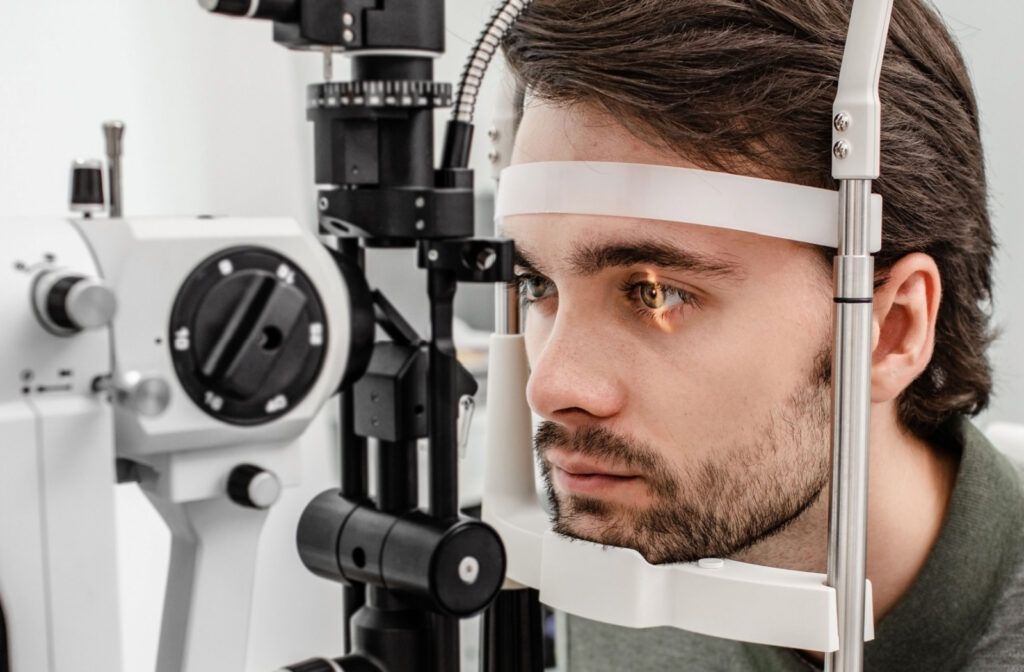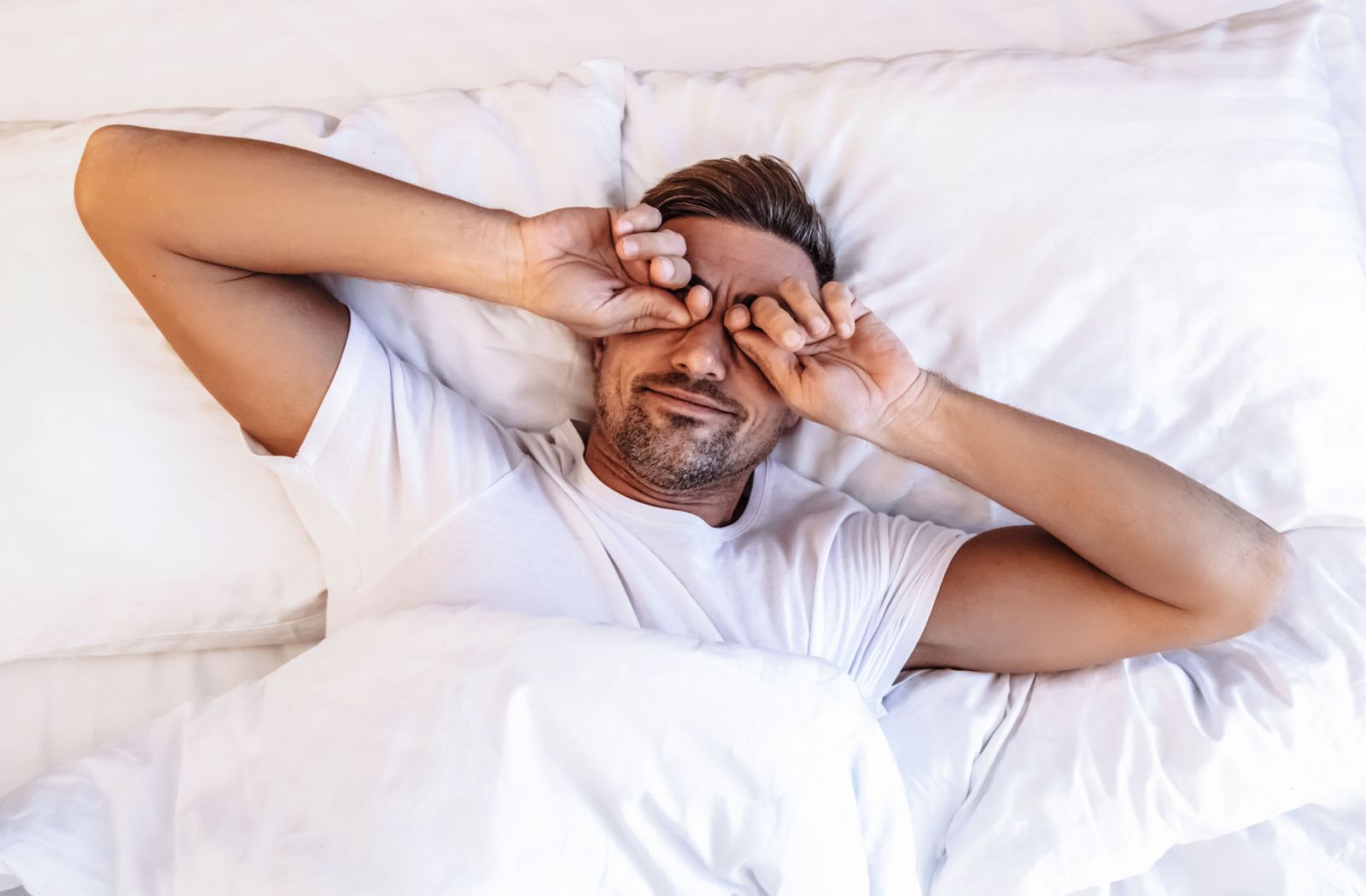Waking up with dry, crusty eyes can be quite frustrating, especially if it’s a recurring problem. You might wonder why your eyes feel so irritated and dry when you wake up in the morning, even when you’ve had a good night’s sleep.
There are several reasons why you might wake up with crusty, irritated, dry eyes, including underlying health problems, nighttime allergies, or your sleep environment. The first step toward dry eye relief is an eye exam to understand why your eyes are dry and then treatment to address the cause.
What Is Dry Eye?
You’ve possibly encountered those moments when your eyes feel parched as a desert. That dry sensation is something a lot of Canadians experience, around 30%, in fact! Essentially, dry eye occurs when your eyes don’t have enough moisture.
Every time you blink, you’re spreading a refreshing layer of tears across your eyes. It’s not just water you’re adding to your eyes, but a fantastic mix of proteins and nutrients. This tear film protects your eyes from dust and debris while keeping them nourished.
And if anything foreign tries to make itself at home on your eye’s surface, like an errant eyelash or a speck of dust, your tears spring into action, trying to wash away the intruder.
However, if you don’t make enough tears or they evaporate too fast, your eyes can become unprotected and dry. Various factors can increase your risk of dry eyes, including:
- Aging
- Female hormones
- Medications, such as antihistamines, blood pressure medications, or antidepressants
- Windy, dry, hot, or smoky environments
- A poor diet lacking omega-3s and vitamin A
- Medical conditions such as Sjogren’s syndrome, rheumatoid arthritis, and lupus
- Wearing contact lenses, especially wearing them for longer than recommended
Dry Eyes at Night
Every day, our eyes are up against drying environmental factors like dust, dry air, and wind. These can leave our eyes feeling strained and tired. Plus, spending a lot of time focusing on screens or concentrating hard can mean we blink less, which can dry out our eyes.
If you’re a contact lens wearer, wearing your lenses for long periods during the day can also lead to dryness and discomfort by the time evening rolls around. So, it’s really important to give your eyes a break to help keep them well-lubricated!
But these primarily explain why your eyes might be dry when you go to bed, what about when you wake up? There are a few things that could be happening at night leaving you with dry eye.
Allergies at Night
Eye allergies can leave your eyes dry, and allergies at night are no different. When allergies kick in, your eyes start producing histamine. This chemical can lead to inflammation and itching, which might tempt you to rub or scratch your eyes, making them even drier.
Allergies don’t just pop up out of nowhere. They’re your immune system’s dramatic reaction to allergens like pollen, dust mites, or pet dander. Even if you have a mild allergy that doesn’t affect you during the day, sleeping in a room with allergens can make you feel like you’re living in a dust storm.
Nocturnal Lagophthalmos (Sleeping with Your Eyes Open)
Our eyelids play an essential role in protecting our eyes and refreshing our tear film. Lagophthalmos is a condition in which your eyelids don’t close completely. For some people, this can happen exclusively at night, in which case it’s called nocturnal lagophthalmos, and they may not even know they have it.
Since people with this condition don’t fully close their eyes while sleeping, their eyelids don’t form a seal to hold in moisture. This gap can leave their eyes open to the elements and can result in dryness in the morning.
Rosacea
Rosacea is a chronic skin condition characterized by reddening, particularly on the face, and can lead to other symptoms such as pimples, spots, and sensitivity. However, when it affects the eyes it’s called ocular rosacea, which can lead to severe inflammation and chronic eye dryness. It’s possible to have ocular rosacea without skin symptoms.
Ocular rosacea can share symptoms with dry eyes, including:
- Redness
- Feeling like something is stuck in your eye
- Swollen eyelids
- Clogging of oily tear glands
- A stye
Dry Eye Therapy
It can be difficult to deal with dry eyes at night. Your optometrist can help you manage dry eye symptoms so your eyes feel refreshed in the morning.
Meibomian gland dysfunction (MGD) causes the majority of dry eye cases. When your meibomian glands become inflamed or blocked, they’re prevented from releasing oils that help keep your tears from evaporating too fast. Your optometrist can offer specialized treatments to unclog glands and reduce inflammation:
- Radiofrequency (RF) Therapy: Radiofrequency therapy, such as the TempSure Envi, employs heat to stimulate the tear glands and increase their output. With this method, doctors use a small probe placed on the inner eyelid to apply heat for a few seconds, after which the area is cooled.
- Intense Pulsed Light (IPL) Therapy: IPL therapy delivers gentle pulses of light to the skin around the eyelids. This triggers the meibomian glands to release the oil that is essential for lubricating the eyes. The therapy can also reduce inflammation, itching, and flushing caused by rosacea.
- Low-Level Light Therapy: Low-level light therapy uses an application of non-visible light in a process called photoactivation. This is intended to “stimulate an immune response in the meibomian glands at the cellular level”, which can promote healthy oil production.
- Heat masks: In some cases, your optometrist can offer specialized heat masks to deliver heat evenly and help loosen mildly clogged glands.

Wake Up Easier with Spectrum
Waking up with dry eyes can be uncomfortable, but it’s important to understand that there are many reasons why this can happen. Once we understand the cause, we can work toward relief.
Treatment may include changing your sleep environment, addressing health concerns, or using heat therapy for MGD—whatever the case, Spectrum Eye Care has your back.
If you experience persistent crusty eyes, dryness, or irritation when you wake up, it’s time to take your morning back! Book an eye exam today, and let’s help you get the good night’s sleep you deserve.

